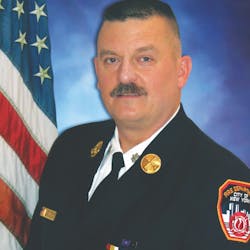The Fire Scene: Everybody Makes Mistakes
W hen I say here and now that everybody makes mistakes, I mean everybody!
Highly paid professional football teams make mistakes and lose games. Military units make mistakes and suffer losses. Construction crews make mistakes and buildings fall down. Police officers make mistakes and are injured and killed.
Of course, members of the fire service are no exception: Fire officers and firefighters make mistakes, often with costly results.
So, what’s the point? The point is, because we all know that mistakes happen to everyone, what can we do to pull something positive out of a negative situation? The way that I look at it, you need a few things to make this happen.
Post-fire evaluation
Personally or as a unit, you must establish and practice some type of evaluation process. Many departments conduct post-fire reviews to discuss and examine the operations of their units. In many departments where this isn’t practiced, officers and chiefs conduct the process on a local level.
You must discuss and uncover what was and wasn’t done at a fire and how something can be done better the next time that members respond.
Good company officers rarely take their crews back to the firehouse without first stopping to take a look at the operation that they just completed. Many battalion chiefs assemble the first-due engine and ladder after a house fire to have a quick discussion about what just occurred. There’s no better time to remember what you did and why than 20 minutes after it happened.
I’ve heard officers ask each of their firefighters how their particular assignment went after a job, only to hear one or two of the firefighters say that they could have done better or should have selected a different route to the roof or the rear or wherever they were assigned.
Written procedures
You must have established policies and procedures for your units to follow and train on. If you don’t have written policies that state how each task or tactic must be conducted, then each chief or officer or firefighter might use whatever tactic that individual prefers. Without established and written procedures, it’s difficult, if not impossible, to get different personnel to operate in a similar manner at basic operations.
Some departments have tactics for every type of building fire. Based on the type of construction and occupancy, apparatus might be positioned differently; firefighters might have different tactical assignments; different tools might be carried by various members to different locations.
When departments don’t provide established procedures, different companies or different crews from the same company will perform as they see fit. I even heard of crews on different shifts pulling the preconnected lines off of the engine at the start of a shift to repack them the way that they like it. Of course, they are trying to do a great job, but it’s difficult to evaluate their work when they aren’t given a game plan.
Embracing the discussion
To minimize mistakes, people must be prepared to have honest discussions after every operation. Yes, I am talking about having the ability to engage in discussions that very well could identify any firefighter or officer as having, in fact, made a mistake. However, I also am talking about people looking forward to post-fire discussions, in an effort to improve themselves, their unit’s operations and the level of service that they provide to the citizens whose lives and property depend on them.
A process
So, you see, making mistakes is something that we all do, but there are things that you can do before and after the mistake that can go a long way in making your next operation a little more “perfect.” These things are done by the department, by the chiefs, by the company officers and by the firefighters. We all can contribute to the process of correcting and improving future operations.
About the Author
John J. Salka Jr.
Battalion Chief
JOHN J. SALKA JR., who is a Firehouse contributing editor, retired as a battalion chief with FDNY, serving as commander of the 18th battalion in the Bronx. Salka has instructed at several FDNY training programs, including the department’s Probationary Firefighters School, Captains Management Program and Battalion Chiefs Command Course. He conducts training programs at national and local conferences and has been recognized for his firefighter survival course, “Get Out Alive.” Salka co-authored the FDNY Engine Company Operations manual and wrote the book "First In, Last Out–Leadership Lessons From the New York Fire Department." He also operates Fire Command Training, which is a New York-based fire service training and consulting firm.

